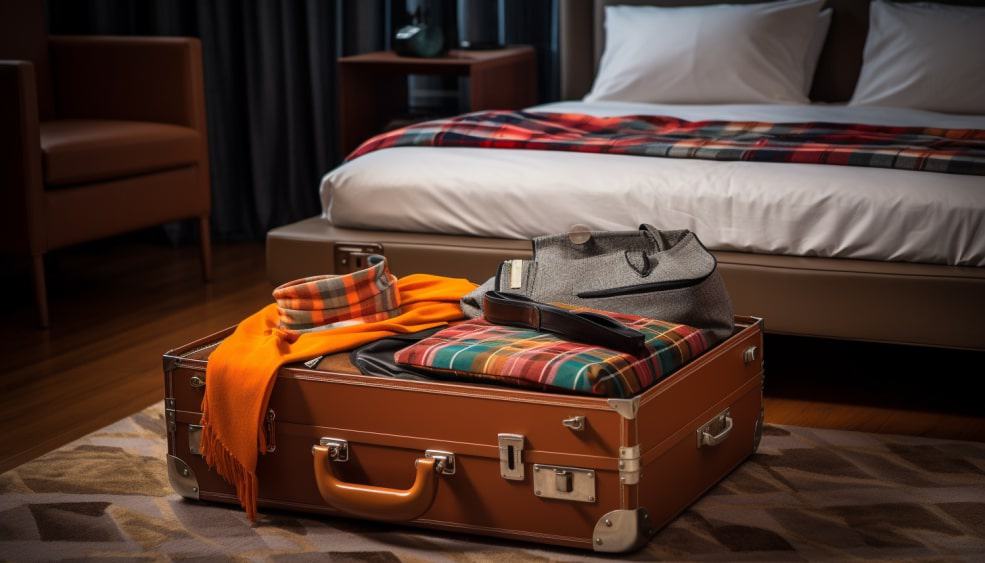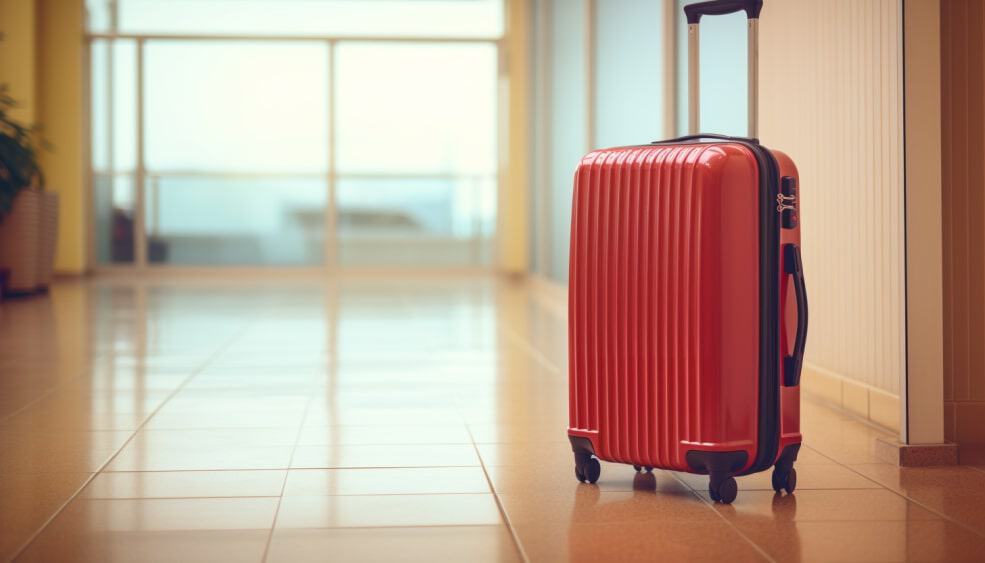Whistler, nestled in the heart of British Columbia’s breathtaking mountains, is a paradise for outdoor enthusiasts. Whether you’re planning to hit the slopes, explore the hiking trails, or simply soak in the natural beauty, packing right is crucial to make the most of your Whistler adventure. This guide will help you navigate the packing process, taking into account Whistler’s unique climate, the array of activities it offers, and the Canadian laws and regulations you need to be aware of. We’ll dive deep into the essentials, from clothing and gear to travel documents, ensuring you’re well-prepared for your trip. So, let’s get started on your journey to becoming a packing pro for your Whistler trip!

Table of Contents
Understanding Whistler’s Climate
Whistler’s climate is a tale of two seasons – the warm, sunny summers and the cold, snowy winters. Each season offers its unique set of activities and experiences, making Whistler a year-round destination. However, this also means that your packing list will vary significantly depending on the time of your visit.
In the summer months, from June to August, Whistler experiences mild to warm temperatures, averaging between 20°C to 27°C. These months are perfect for hiking, mountain biking, and camping. You’ll need lightweight, breathable clothing, a good pair of hiking boots, and camping gear if you plan to spend a night under the stars. Don’t forget your swimsuit for a dip in one of Whistler’s many beautiful lakes!
On the other hand, winter in Whistler, from December to March, is all about snow. With temperatures often dropping below freezing, it’s a winter wonderland that attracts skiers and snowboarders from around the world. For this season, you’ll need warm, waterproof clothing, ski or snowboard gear, and sturdy winter boots. Remember, it’s all about layering to stay warm without sacrificing mobility.
The shoulder seasons – spring (April and May) and fall (September to November) – offer a mix of conditions. Spring is a time of melting snow and blooming flowers, while fall showcases a beautiful display of autumn foliage. The weather during these seasons can be unpredictable, so it’s best to pack a mix of light and warm clothing, along with waterproof items for those unexpected showers.
Understanding Whistler’s climate and how it impacts your activities is the first step in creating a packing list that ensures you’re well-prepared for your trip. Remember, the key is to pack versatile items that can be layered or adjusted to suit the changing weather conditions.
Whistler’s Average Temperatures and Precipitation
Key Takeaway: Whistler’s climate varies significantly between seasons, so your packing list should be tailored to the time of your visit. Summer calls for lightweight, breathable clothing and hiking gear, while winter requires warm, waterproof clothing and ski or snowboard gear. The shoulder seasons demand a mix of both.
Essential Clothing Items
When packing for Whistler, your clothing choices should be guided by two key factors: the season of your visit and the activities you plan to engage in. Let’s break down the clothing essentials for summer and winter, the two main seasons in Whistler.
Summer Essentials
Summer in Whistler is all about outdoor adventures, from hiking and mountain biking to canoeing and swimming. The weather is generally warm, but it can get chilly in the evenings or at higher altitudes. Here’s what you should pack:
- Lightweight Clothing: Pack breathable clothing like t-shirts, shorts, and light dresses for the warm daytime temperatures. Opt for moisture-wicking fabrics if you plan on engaging in strenuous activities.
- Warm Layers: For cooler evenings and high-altitude areas, pack a lightweight fleece or sweater and a pair of long pants.
- Rain Jacket: Summer showers are not uncommon in Whistler, so a waterproof rain jacket is a must.
- Hiking Boots: If you plan on hiking, a sturdy pair of hiking boots is essential. Make sure they’re broken in before your trip to avoid blisters.
- Swimsuit: Don’t forget your swimsuit for those refreshing dips in Whistler’s lakes!
- Hat and Sunglasses: Protect yourself from the sun with a hat and a good pair of UV-protective sunglasses.
- Accessories: Pack a reusable water bottle to stay hydrated, and a backpack or daypack for your outdoor adventures.
Winter Essentials
Winter in Whistler is synonymous with snow sports. Whether you’re a skier, a snowboarder, or just there to enjoy the snowy scenery, staying warm and dry is crucial. Here’s your winter packing list:
- Thermal Underwear: Start with a base layer of thermal underwear to keep you warm.
- Insulating Layers: Add insulating layers like fleece sweaters or down jackets.
- Waterproof Outerwear: A waterproof ski jacket and snow pants are essential to keep you dry.
- Snow Boots: Pack a pair of waterproof snow boots with good grip.
- Winter Accessories: Don’t forget a warm hat, gloves, and a scarf or neck gaiter. If you’re skiing or snowboarding, you’ll also need ski socks, goggles, and a helmet.
- Hand and Toe Warmers: These can be a lifesaver on particularly cold days.
Remember, the key to dressing for winter is layering. This allows you to add or remove layers as needed to stay comfortable. For a full list of winter essentials in Whistler, read this article.
Key Takeaway: Your clothing choices for Whistler should be guided by the season and your planned activities. Summer calls for lightweight clothing, warm layers for the evenings, and hiking gear, while winter requires thermal and waterproof clothing for snow sports.
Hiking and Camping Gear
If you’re planning to hike or camp in Whistler during the summer months, you’ll need to pack some specific gear. Here’s a list of essentials:
- Backpack: A sturdy backpack is essential for carrying your gear. Choose one with good support and plenty of compartments for organization.
- Hiking Boots: As mentioned earlier, a good pair of hiking boots is crucial. They should be waterproof, supportive, and broken in before your trip.
- Hiking Poles: These can help with balance and reduce strain on your knees, especially during downhill sections.
- Camping Equipment: If you plan to camp, you’ll need a tent, sleeping bag, and camping mat. Choose lightweight and compact options to save space in your backpack.
- Cooking Equipment: A portable stove, fuel, and cooking utensils are necessary for preparing meals. Don’t forget a lighter or matches!
- Water Purification: Pack a water filter or purification tablets to ensure you have access to safe drinking water.
- First Aid Kit: Always carry a basic first aid kit with band-aids, antiseptic wipes, tweezers, and any personal medication.
- Navigation Tools: Even if you plan to use your phone, it’s a good idea to carry a map and compass as backups.
- Headlamp: A headlamp is essential for navigating in the dark and keeping your hands free.
Remember, when hiking and camping in Whistler, it’s important to follow the Leave No Trace principles to protect the environment.
Skiing and Snowboarding Gear
If you’re visiting Whistler in the winter, chances are you’ll want to hit the slopes. Here’s what you’ll need:
- Skis or Snowboard: You can bring your own or rent from one of the many rental shops in Whistler.
- Boots: Ski or snowboard boots are essential. Like hiking boots, they should be comfortable and well-fitted.
- Poles: If you’re skiing, you’ll need a pair of poles.
- Helmet: Safety first! A helmet is a must for skiing and snowboarding.
- Goggles: Protect your eyes from the snow and sun with a pair of goggles. Choose lenses that are suitable for the expected weather conditions.
- Gloves: A good pair of waterproof gloves is crucial to keep your hands warm and dry.
- Ski Socks: Choose socks that are designed for skiing or snowboarding. They should be warm, cushioned, and moisture-wicking.
Remember, skiing and snowboarding equipment can be bulky and expensive to transport. If you’re not a regular skier or snowboarder, renting equipment in Whistler might be a more convenient and cost-effective option.
Key Takeaway: When packing for outdoor activities in Whistler, consider the specific gear you’ll need. For hiking and camping, this includes a backpack, hiking boots, camping equipment, and safety items. For skiing or snowboarding, you’ll need equipment like skis or a snowboard, boots, a helmet, and appropriate clothing.
Travel Documents and Essentials
When planning your trip to Whistler, it’s important to remember that you’re not just packing for the outdoor adventures, but also for the journey itself. Here are some travel documents and essentials you should include in your packing list:
- Passport: Your passport is the most important document you’ll need, especially if you’re traveling to Canada from another country. Make sure it’s valid for at least six months beyond your planned departure date.
- Visa or eTA: Depending on your nationality, you may need a visa or an Electronic Travel Authorization (eTA) to enter Canada. Check the official Canadian government website for the most accurate information.
- Driver’s License: If you plan on renting a car in Whistler, don’t forget your driver’s license. International travelers should check if they need an International Driving Permit.
- Travel Insurance Documents: It’s always a good idea to have travel insurance that covers medical expenses, trip cancellation, and loss or damage to luggage. Keep a copy of your insurance policy and contact numbers handy.
- Credit and Debit Cards: Inform your bank about your travel plans to avoid any issues with your cards while abroad. It’s also a good idea to have some Canadian currency for small expenses.
- Reservation Confirmations: Print out or save digital copies of your flight, accommodation, and car rental confirmations. You might also have bookings for activities or restaurants.
- Emergency Contacts: Write down important numbers like your country’s embassy or consulate in Canada, emergency services (911 in Canada), and contacts of family or friends.
In addition to these documents, there are a few more essentials you should pack in your carry-on:
- Medications: If you take prescription medications, bring enough for the duration of your trip, along with a copy of the prescription. It’s also a good idea to pack a small travel first aid kit with band-aids, pain relievers, and any other personal necessities.
- Electronics: Don’t forget your phone, charger, and any other electronics you’ll need. If you’re traveling from a country with different plug types, you might need a power adapter.
- Snacks: Pack some snacks for the journey, especially if you have dietary restrictions.
- Entertainment: Bring a book, download movies or music, or pack anything else that will keep you entertained during your flight or transit.
Remember, while it’s important to be prepared, there’s no need to overpack. Most items can easily be purchased in Whistler if you forget something.
Key Takeaway: When packing for your trip to Whistler, don’t forget the essentials like travel documents, credit and debit cards, reservation confirmations, and emergency contacts. Also, pack a carry-on with essentials for the journey, including medications, electronics, snacks, and entertainment.

Health and Safety Items
When packing for a trip to Whistler, it’s important to consider your health and safety. Here are some items you should include in your packing list:
- First Aid Kit: A basic first aid kit is essential for any trip. It should include band-aids, antiseptic wipes, tweezers, and any personal medication. If you’re planning on hiking or camping, consider adding items like blister plasters, a space blanket, and a whistle.
- Sun Protection: The sun can be strong in Whistler, especially in the summer and on the ski slopes. Pack a good sunscreen with a high SPF, lip balm with SPF, and a pair of sunglasses with UV protection.
- Insect Repellent: If you’re visiting in the summer, an insect repellent can be useful, especially if you’re planning on hiking or camping.
- Hand Sanitizer and Masks: In light of the ongoing COVID-19 pandemic, it’s a good idea to pack hand sanitizer and a few masks.
- Medications: Don’t forget any prescription medications you take regularly. It’s also a good idea to bring over-the-counter medications for common ailments like headaches, colds, and stomach issues.
- Water Bottle: Staying hydrated is crucial, especially during outdoor activities. Bring a reusable water bottle that you can refill throughout the day.
- Emergency Contacts and Information: Write down important numbers like emergency services (911 in Canada), the nearest hospital to your accommodation, and contacts of family or friends. If you have a medical condition, carry information about it and what to do in case of an emergency.
Remember, while it’s important to be prepared, there’s no need to overpack. Most items can easily be purchased in Whistler if you forget something. Also, always follow local guidelines and regulations to ensure your safety and the safety of others.
Key Takeaway: When packing for your trip to Whistler, don’t forget health and safety items like a first aid kit, sun protection, insect repellent, hand sanitizer, masks, medications, a water bottle, and emergency contacts and information.
Tips for Packing Light and Efficiently
Packing for a trip to Whistler can seem daunting, especially when you need to consider different weather conditions and activities. However, with a few smart strategies, you can pack light without leaving out any essentials. Here are some tips:
- Choose Versatile Clothing: Opt for clothing items that can be worn in multiple ways or for different occasions. For example, a waterproof jacket can double as a windbreaker, and hiking pants can be worn in the city as well.
- Layer Up: Instead of packing heavy coats, consider layering lighter items. This not only saves space but also allows you to adjust your outfit according to the weather.
- Limit Your Shoes: Shoes can take up a lot of space in your luggage. Try to limit yourself to two or three pairs that are suitable for different activities and occasions.
- Roll Your Clothes: Rolling your clothes instead of folding them can save space and prevent wrinkles. You can also use packing cubes to organize your items and compress your clothes.
- Pack Travel-Sized Toiletries: To save space and weight, pack travel-sized versions of your toiletries. You can also consider buying some items in Whistler.
- Use Every Bit of Space: Make use of all the space in your luggage. For example, you can stuff socks or other small items inside your shoes.
- Keep Important Items in Your Carry-On: Pack your travel documents, valuables, and any essentials like medication or a change of clothes in your carry-on. This way, you’ll have everything you need even if your checked luggage gets lost or delayed.
Remember, the goal is to pack as light as possible while still being prepared for your trip. It’s always a good idea to check the weight and size limits of your airline to avoid any extra fees.
Key Takeaway: Packing light for your trip to Whistler is possible with a few smart strategies. Choose versatile clothing, layer up, limit your shoes, roll your clothes, pack travel-sized toiletries, use every bit of space, and keep important items in your carry-on.
Understanding Canadian Laws and Regulations
Traveling to a new country comes with the responsibility of understanding and adhering to its laws and regulations. Here are some Canadian laws and regulations that might be relevant to your trip to Whistler:
- Entry Requirements: Canada has specific entry requirements based on your nationality. Most travelers will need a valid passport and may also require a visa or an Electronic Travel Authorization (eTA). Check the official Canadian government website for the most accurate information.
- Driving Laws: If you plan on driving in Canada, you’ll need a valid driver’s license. Some international travelers may also need an International Driving Permit. Remember, in Canada, we drive on the right side of the road.
- Alcohol Laws: The legal drinking age in British Columbia is 19. It’s illegal to drive with a blood alcohol concentration (BAC) of 0.08% or higher.
- Cannabis Laws: Cannabis is legal in Canada for both medical and recreational use. However, it’s illegal to travel across the Canadian border with cannabis, regardless of whether you’re entering or leaving the country.
- Wildlife Laws: In Whistler, you’re likely to encounter wildlife. It’s illegal (and dangerous) to feed, pet, or approach wildlife in Canada. Always observe animals from a distance.
- Outdoor Activity Regulations: Many outdoor activities in Whistler take place in protected areas. Make sure to follow all rules and regulations, including staying on marked trails, not leaving any trash behind, and respecting wildlife.
Remember, this is not a comprehensive list, and laws can change. It’s always a good idea to do your own research before your trip. When in doubt, ask a local or someone in authority.
Key Takeaway: When traveling to Whistler, it’s important to understand and adhere to Canadian laws and regulations. These include entry requirements, driving laws, alcohol and cannabis laws, wildlife laws, and regulations for outdoor activities.
Local Businesses for Last-Minute Needs
No matter how well you pack, there’s always a chance you might forget something or need to pick up a few items upon arrival. Luckily, Whistler has a variety of local businesses that can cater to your last-minute needs:
- Grocery Stores: Whistler has several grocery stores where you can pick up food and other essentials. Some options include Whistler Grocery Store, Nesters Market, and IGA Marketplace.
- Outdoor Gear Stores: If you need to buy or rent outdoor gear, there are plenty of options in Whistler. Check out stores like Escape Route, Whistler Blackcomb Rentals, or Can-Ski.
- Pharmacies: For health and wellness needs, head to Shoppers Drug Mart or Rexall. These pharmacies also carry a range of toiletries and personal care items.
- Liquor Stores: If you’re looking to buy alcohol, you can visit BC Liquor Stores or Whistler Liquor Store. Remember, the legal drinking age in British Columbia is 19.
- Bookstores: If you’re looking for a good book for your trip, Armchair Books is a local favorite.
- Clothing Stores: Whistler has a range of clothing stores, from budget to high-end. You can find everything from outdoor clothing to stylish outfits for a night out.
Remember, shopping locally is a great way to support the Whistler community. Plus, you might find some unique items that you wouldn’t find back home!
Key Takeaway: Whistler has a variety of local businesses where you can pick up last-minute items, from grocery stores and outdoor gear stores to pharmacies and clothing stores.
Ready, Set, Adventure!
You’ve made it to the end of this comprehensive packing guide for Whistler, and now you’re ready to embark on your adventure! You’ve learned about Whistler’s climate, the essential clothing items for summer and winter, the gear you’ll need for outdoor activities, the necessary travel documents and essentials, the health and safety items to pack, tips for packing light and efficiently, and the Canadian laws and regulations you need to be aware of. You even know where to shop in Whistler for any last-minute needs.
Remember, the key to a successful trip is preparation. By packing appropriately for the weather and your planned activities, you can ensure a comfortable and enjoyable experience. But also remember that travel is unpredictable, and it’s okay if things don’t go exactly as planned. That’s part of the adventure!
So, double-check your packing list, make sure you have all your essentials, and then… let the adventure begin! Whistler’s stunning landscapes, thrilling outdoor activities, and welcoming community are waiting for you. Whether you’re hitting the slopes, hiking the trails, or exploring the local culture, you’re sure to create unforgettable memories.
Safe travels, and enjoy your Whistler adventure!
Key Takeaway: With this comprehensive packing guide, you’re now ready for your Whistler adventure. Remember to pack appropriately for the weather and your activities, double-check your packing list, and embrace the unpredictability of travel. Safe travels!
Frequently Asked Questions
After reading this comprehensive guide, you might still have a few questions about packing for your trip to Whistler. Here are some frequently asked questions that might help:
- Can I rent outdoor gear in Whistler?
Yes, you can rent outdoor gear in Whistler. There are several rental shops where you can rent equipment for skiing, snowboarding, mountain biking, and other outdoor activities. This can be a convenient and cost-effective option, especially if you’re not a regular participant in these activities.
- What type of power outlets does Canada use?
Canada uses Type A and Type B power outlets. Type A outlets have two flat parallel pins, while Type B outlets have two flat parallel pins and a grounding pin. The standard voltage is 120 V, and the standard frequency is 60 Hz. If your devices use a different type of plug or are not compatible with these voltages and frequencies, you’ll need a power adapter or converter.
- Can I buy toiletries and other personal items in Whistler?
Yes, you can buy toiletries and other personal items in Whistler. There are several grocery stores and pharmacies where you can find these items. However, if you use specific brands or products, it might be a good idea to bring them from home as they might not be available in Whistler.
- What should I do if I forget something?
Don’t worry if you forget something. Whistler has a variety of shops where you can buy most items. For more specific or expensive items, like prescription medications or glasses, it might be worth arranging to have them sent to you.
- Can I drink tap water in Whistler?
Yes, the tap water in Whistler is safe to drink. In fact, Whistler’s tap water comes from mountain streams and is considered some of the best in the world. However, if you’re hiking or camping, you should treat water from streams or lakes before drinking it.
Sources
- Whistler. “Whistler Weather, Snow Report and Forecast | Tourism Whistler.” Tourism Whistler, 2023, www.whistler.com/weather/. Accessed 20 July 2023.
- Wilson, Megan. “How to Plan and Pack for a Ski Trip to Whistler.” The Whistler Insider, 24 Oct. 2018, www.whistler.com/blog/post/2018/10/24/how-to-plan-and-pack-for-a-ski-trip-to-whistler/. Accessed 20 July 2023.
- “The Seven Principles of Leave No Trace | Leave No Trace Canada.” Leave No Trace | sans Trace Canada, 15 Jan. 2023, leavenotrace.ca/the-seven-principles-of-leave-no-trace/. Accessed 20 July 2023.
- and, Refugees. “Immigration and Citizenship – Canada.ca.” Canada.ca, 2023, www.canada.ca/en/services/immigration-citizenship.html. Accessed 20 July 2023.
- Heathrow Airport. “How To: Pack like a Pro.” YouTube, YouTube Video, 6 Mar. 2012, www.youtube.com/watch?v=LIk8v__Osm8. Accessed 20 July 2023.




